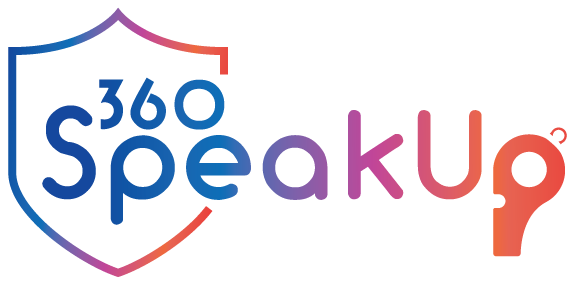How We Work
Understanding Ethics Reporting
Ethics reporting allows employees, customers, and stakeholders to raise concerns about potential wrongdoing in the workplace. Our 360SpeakUp service provides a secure channel when normal reporting methods are unsuitable or unavailable.
We serve as an independent bridge between you and your organization’s leadership. When standard reporting channels are inappropriate – perhaps because your supervisor is involved, or you have confidentiality concerns – we provide an alternative ensuring your voice reaches the right people.
The 360SpeakUp Process
Simple, Secure, and Professional – Our Three-Step Process with Clear Service Boundaries
Step 1: Report Safely & Anonymously
Multi-Channel Secure Reporting with AI-Powered Processing
Our comprehensive reporting infrastructure accommodates diverse stakeholder preferences through professionally managed channels, ensuring accessibility while maintaining the highest confidentiality and security standards.
1. Secure AI-Powered Web Portal
- Multilingual reporting platform with intelligent form processing
- Automated case creation, validation, and formatting
- Real-time AI processing and immediate case number generation
- Complete AI-powered workflow from submission to analysis
2. Email
- Email reporting using standardized templates
- Surface mail review (converted to digital format) – optional
- Automated evidence processing and case standardization
3. Professional Hotline
- Human conversation and emotional connection during distressing reports
- Professional emotional guidance for complex or sensitive matters
- Real-time case entry into our AI system during calls
- Multi-language human support with cultural understanding
All channels immediately feed into our unified AI-powered processing system for consistent forensic analysis.
AI-Powered Anonymity Protection: All submissions are automatically processed anonymously by our AI system, regardless of reporter willingness to provide identity. Contact details, when provided, are AI-encrypted and stored separately for authorized progress updates only.
Step 2: AI-Powered Forensic Grade Analysis
Forensic-Grade Analysis with Professional Oversight
Within 72 hours of submission, your case enters our proprietary AI investigation engine where forensic-grade analysis is conducted using Big 4 consulting methodologies. Our system employs a sophisticated four-stage assessment process including initial risk classification, evidence authentication, behavioral analysis, and comprehensive summary generation.
4-Stage AI Assessment Process
- Initial risk classification and evidence processing
- Pattern recognition and behavioral analysis
- Cross-reference validation and credibility scoring
- Comprehensive summary with strategic recommendations
Professional Intelligence Foundation: Our AI-powered approach delivers consistent, objective analysis while our compliance professionals provide strategic oversight for quality assurance and appropriate escalation protocols.
Step 3: Clear, Actionable Reports
Clear Service Boundaries with Complete Case Ownership Transfer
Our Service Scope Ends Here: Upon completion of AI-powered analysis, we deliver comprehensive investigation reports to your organization’s designated ethics committee. This marks the conclusion of our service responsibility.
What We Provide
- Forensic-grade investigation analysis
- Professional case merit assessment
- Strategic recommendations and risk evaluation
- Decision-ready intelligence foundation
- Regulatory compliance guidance
What Remains Your Organization’s Responsibility
- All final outcomes and disciplinary actions
- Internal investigation procedures and decisions
- Case resolution and employee communications
- Anti-retaliation policy enforcement
- Implementation of recommended actions
Professional Handover Standards
- Complete case documentation with clear findings
- Strategic intelligence delivered in preferred format/language
- Clean responsibility transfer to your ethics committee
- Ongoing support limited to clarifications on delivered analysis
- No ongoing case management or outcome involvement
Retaliation Protection Approach: While our direct service responsibility ends with report delivery, any retaliation incidents reported to us receive immediate priority escalation to your organization’s ethics committee. Your organization maintains full responsibility for anti-retaliation enforcement and employee protection.
Who Can Report
Our ethics reporting service is available to anyone with a legitimate business relationship to your organization:





Experience AI-Powered Investigation Intelligence
See the difference between our forensic-grade reports and basic reporting
Or Call/WhatsApp Us at:
+91 8138948284
Reporting Guidelines
Clear guidelines on workplace concerns that can be reported through 360SpeakUp.
What to Report
Financial Misconduct: Manipulation of accounting records, inappropriate revenue recognition, hidden expenses, false expense claims, or pressure to alter financial reporting.
Business Integrity Violations: Inappropriate benefits from vendors, contract manipulation for personal gain, facilitation payments, or business decisions influenced by personal financial interests.
Procurement Issues: Vendor favoritism without justification, inflated pricing, procurement officials receiving inappropriate benefits, false invoicing, or phantom vendor arrangements.
Workplace Discrimination and Harassment: Hiring or promotion decisions based on factors other than merit, sexual harassment, creation of hostile work environments, or intimidation tactics.
Substance Abuse and Safety Concerns: Employees working under influence of alcohol or drugs, especially in safety-sensitive roles. For immediate safety threats, contact security or management directly rather than using the ethics process.
Inappropriate Gifts and Entertainment: Expensive gifts from vendors or clients that could influence business decisions, entertainment expenses disproportionate to business value, or personal favors exchanged for business advantages.
Regulatory Compliance Concerns: Questionable tax practices, foreign exchange violations, environmental non-compliance, or business practices designed to circumvent regulations. For serious legal violations, inform management directly to ensure prompt legal counsel.
Marketing and Competition Issues: False advertising claims, inappropriate competitive practices, customer data misuse, or agreements that restrict fair competition.
Misuse of Company Resources: Company property used for personal benefit, unauthorized use of company funds or credit cards, or schemes diverting company resources for personal gain.
Intellectual Property Violations: Sharing confidential information inappropriately, disclosing proprietary processes without authorization, or using company trade secrets for personal benefit.
What Not to Report
Criminal Matters: Physical assault, theft of significant value, drug trafficking, threats of violence, or any cognizable offense. Report directly to management or law enforcement.
HR and Employment Issues: Salary disputes, promotion decisions, performance evaluations, leave policies, transfer requests, shift schedules, or general employment terms and conditions.
Personal and Interpersonal Conflicts: Personality clashes, professional disagreements, communication style differences, or normal workplace tensions between colleagues.
Business and Operational Decisions: Strategic decisions, organizational restructuring, budget allocations, vendor selection based on legitimate criteria, or policy changes within management authority.
Performance Issues: Productivity concerns, work quality standards, attendance problems, or routine performance coaching matters.
Technical and Customer Issues: IT problems, system failures, routine customer complaints, product quality issues, or service delivery problems.
Personal Legal Matters: Individual financial difficulties, family issues, personal legal proceedings, or conduct outside the workplace that doesn’t impact business operations.
Insufficient Reports: Vague allegations, speculative concerns without supporting information, or malicious submissions.
Frequently Asked Questions
Questions About 360SpeakUp? We Have Answers.
Do you handle the complete investigation process?
No. We provide professional investigation analysis and strategic intelligence as the foundation for your internal decision-making. Our service responsibility ends when we deliver comprehensive reports to your ethics committee. All final outcomes, disciplinary actions, and case resolutions remain entirely within your organization’s control.
Why do you use human operators for hotline instead of automated systems?
When people call a hotline, they’re often in emotional distress and need human connection. We maintain human operators specifically for the hotline to provide that emotional support and professional guidance during difficult conversations. All other channels are AI-powered for efficiency, but the hotline preserves the human touch when people need it most. However, our corporate package includes provision for automated hotline options, especially for overseas operations where 24/7 human coverage may not be practical.
What happens after you deliver the investigation report?
Our service responsibility concludes upon report delivery. Your organization’s ethics committee assumes complete case ownership, including all decisions about investigations, outcomes, and actions. We provide ongoing support only for clarifications about our delivered analysis.
